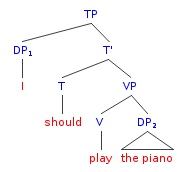According to what I have learnt, I wouldn't say that should is a tense, but I would say that it carries a past tense inflection. And about your idea of T merging with V, I would suggest considering the following. Basically, there is a hypothesis saying that TPs are headed by a T constituent, either overt or null. Merging occurs, but that wouldn't fully explain what happens to T. In your fist example, the head of T is the modal auxiliary verb, but in the finite clause, the T would have a null phonetic spell out of a tense affix which also carries person and number features. The idea is that heads cannot be empty, and in this case the tense affix undergoes a morphological operation called affix hopping. Thus, in the sentence I played the piano, the T head would be something like Tense-3SgPr and it would be lowered onto the head V play. The derived structure would be [play+Affix-3SgPr], which in turn would be spelled out as played. See Radford (2006) for a more detailed explanation.
